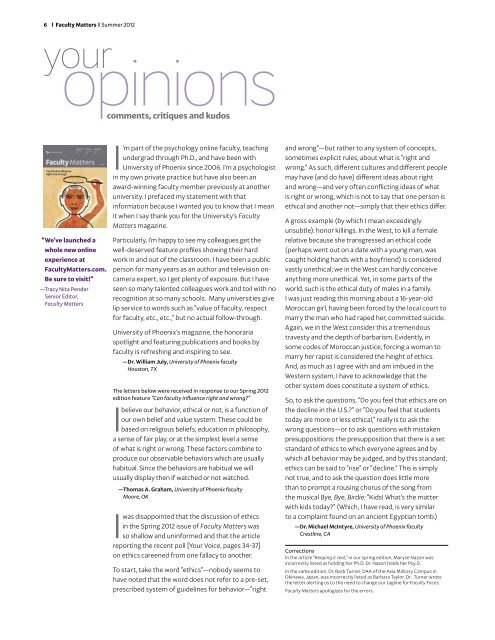newsadvancements and initiatives - Faculty Matters
newsadvancements and initiatives - Faculty Matters
newsadvancements and initiatives - Faculty Matters
You also want an ePaper? Increase the reach of your titles
YUMPU automatically turns print PDFs into web optimized ePapers that Google loves.
6<br />
<strong>Faculty</strong> <strong>Matters</strong> Summer 2012<br />
your<br />
opinions<br />
“ We’ve launched a<br />
whole new online<br />
experience at<br />
<strong>Faculty</strong><strong>Matters</strong>.com.<br />
Be sure to visit!”<br />
— Tracy Nita Pender<br />
Senior Editor,<br />
<strong>Faculty</strong> <strong>Matters</strong><br />
comments, critiques <strong>and</strong> kudos<br />
I<br />
’m part of the psychology online faculty, teaching<br />
undergrad through Ph.D., <strong>and</strong> have been with<br />
University of Phoenix since 2006. I’m a psychologist<br />
in my own private practice but have also been an<br />
award-winning faculty member previously at another<br />
university. I prefaced my statement with that<br />
information because I wanted you to know that I mean<br />
it when I say thank you for the University’s <strong>Faculty</strong><br />
<strong>Matters</strong> magazine.<br />
Particularly, I’m happy to see my colleagues get the<br />
well-deserved feature profiles showing their hard<br />
work in <strong>and</strong> out of the classroom. I have been a public<br />
person for many years as an author <strong>and</strong> television oncamera<br />
expert, so I get plenty of exposure. But I have<br />
seen so many talented colleagues work <strong>and</strong> toil with no<br />
recognition at so many schools. Many universities give<br />
lip service to words such as “value of faculty, respect<br />
for faculty, etc., etc.,” but no actual follow-through.<br />
University of Phoenix’s magazine, the honoraria<br />
spotlight <strong>and</strong> featuring publications <strong>and</strong> books by<br />
faculty is refreshing <strong>and</strong> inspiring to see.<br />
— Dr. William July, University of Phoenix faculty<br />
Houston, TX<br />
The letters below were received in response to our Spring 2012<br />
edition feature “Can faculty influence right <strong>and</strong> wrong?”<br />
I<br />
believe our behavior, ethical or not, is a function of<br />
our own belief <strong>and</strong> value system. These could be<br />
based on religious beliefs, education in philosophy,<br />
a sense of fair play, or at the simplest level a sense<br />
of what is right or wrong. These factors combine to<br />
produce our observable behaviors which are usually<br />
habitual. Since the behaviors are habitual we will<br />
usually display then if watched or not watched.<br />
— Thomas A. Graham, University of Phoenix faculty<br />
Moore, OK<br />
Iwas disappointed that the discussion of ethics<br />
in the Spring 2012 issue of <strong>Faculty</strong> <strong>Matters</strong> was<br />
so shallow <strong>and</strong> uninformed <strong>and</strong> that the article<br />
reporting the recent poll [Your Voice, pages 34-37]<br />
on ethics careened from one fallacy to another.<br />
To start, take the word “ethics”—nobody seems to<br />
have noted that the word does not refer to a pre-set,<br />
prescribed system of guidelines for behavior—“right<br />
<strong>and</strong> wrong”—but rather to any system of concepts,<br />
sometimes explicit rules, about what is “right <strong>and</strong><br />
wrong.” As such, different cultures <strong>and</strong> different people<br />
may have (<strong>and</strong> do have) different ideas about right<br />
<strong>and</strong> wrong—<strong>and</strong> very often conflicting ideas of what<br />
is right or wrong, which is not to say that one person is<br />
ethical <strong>and</strong> another not—simply that their ethics differ.<br />
A gross example (by which I mean exceedingly<br />
unsubtle): honor killings. In the West, to kill a female<br />
relative because she transgressed an ethical code<br />
(perhaps went out on a date with a young man, was<br />
caught holding h<strong>and</strong>s with a boyfriend) is considered<br />
vastly unethical; we in the West can hardly conceive<br />
anything more unethical. Yet, in some parts of the<br />
world, such is the ethical duty of males in a family.<br />
I was just reading this morning about a 16-year-old<br />
Moroccan girl, having been forced by the local court to<br />
marry the man who had raped her, committed suicide.<br />
Again, we in the West consider this a tremendous<br />
travesty <strong>and</strong> the depth of barbarism. Evidently, in<br />
some codes of Moroccan justice, forcing a woman to<br />
marry her rapist is considered the height of ethics.<br />
And, as much as I agree with <strong>and</strong> am imbued in the<br />
Western system, I have to acknowledge that the<br />
other system does constitute a system of ethics.<br />
So, to ask the questions, “Do you feel that ethics are on<br />
the decline in the U.S.?” or “Do you feel that students<br />
today are more or less ethical,” really is to ask the<br />
wrong questions—or to ask questions with mistaken<br />
presuppositions: the presupposition that there is a set<br />
st<strong>and</strong>ard of ethics to which everyone agrees <strong>and</strong> by<br />
which all behavior may be judged, <strong>and</strong> by this st<strong>and</strong>ard,<br />
ethics can be said to “rise” or “decline.” This is simply<br />
not true, <strong>and</strong> to ask the question does little more<br />
than to prompt a rousing chorus of the song from<br />
the musical Bye, Bye, Birdie: “Kids! What’s the matter<br />
with kids today?” (Which, I have read, is very similar<br />
to a complaint found on an ancient Egyptian tomb.)<br />
— Dr. Michael McIntyre, University of Phoenix faculty<br />
Crestline, CA<br />
Corrections<br />
In the article “Keeping it real,” in our spring edition, Maryse Nazon was<br />
incorrectly listed as holding her Ph.D. Dr. Nazon holds her Psy.D.<br />
In the same edition, Dr. Barb Turner, DAA of the Asia Military Campus in<br />
Okinawa, Japan, was incorrectly listed as Barbara Taylor. Dr. Turner wrote<br />
the letter alerting us to the need to change our tagline for <strong>Faculty</strong> Faces.<br />
<strong>Faculty</strong> <strong>Matters</strong> apologizes for the errors.


